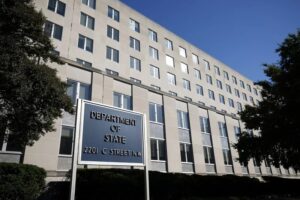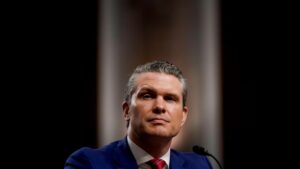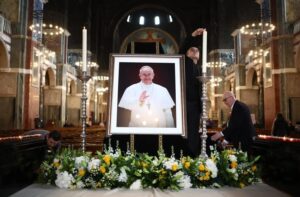
The National Interest Foundation Newsletter
Issue 283, April 25, 2025
Welcome to our NIF Newsletter. In this week’s edition, we examine Secretary of State Marco Rubio’s plans to eliminate major State Department activities, provide analysis on Secretary of Defense Pete Hegseth coming under fire again for sharing sensitive information in another Signal group chat, and look into the passing of Pope Francis and his legacy as a human rights advocate.
Editor: Bassam Tarbush
Secretary of State Rubio Eliminates Major State Department Activities

The proposed overhaul has elicited concern as it would close agency offices dedicated to furthering human rights, advancing democracy overseas, and preventing war crimes. (Photo from Getty Images)
On Tuesday, U.S. Secretary of State Marco Rubio unveiled plans for a massive shake-up of the State Department – one which troublingly seeks to target human rights programs and others focused on democracy promotion, preventing war crimes, and combating extremism. The measures proposed would eliminate or restructure over 130 offices and at least 700 positions within the leading foreign policy agency in the United States, amounting to a 17% reduction. Some State Department officials have highlighted how the plan could result in major downsizing which would possibly affect tens of thousands of global employees, in addition to numerous U.S. consulates and facilities abroad. The shake-up plans have been passed along to the Senate Foreign Relations Committee and the House Foreign Affairs Committee – the entities responsible for oversight of the State Department – where lawmakers on both sides of the aisle have raised concerns about the significant changes, many of which have not been clearly explained, were developed without consultation of Congress, and leave questions as to how they will functionally alter things. On top of the lack of clarity and these other issues is the fear that the changes are being proposed simply to satisfy Department of Government Efficiency (DOGE) desires for cuts without properly taking into account the damage that they could inflict on American interests, diplomacy, and multilateral foreign policy.
The various cuts and restructurings proposed consist of many that have evoked unease. This includes the closure of the Office of Global Criminal Justice – a body that seeks to investigate war crimes – as well as the Bureau of Conflict and Stabilization Operations – one that works to prevent wars. As observers have pointed out, these bureaus play an important role in helping to implement the Global Fragility Act (GFA), a bipartisan-passed law which improves the ways that the U.S. government advances conflict prevention and stabilization around the world, and the Elie Wiesel Genocide and Atrocities Prevention Act, a law that provides critical training for foreign service officers assigned to a country experiencing or at risk of mass atrocities such as genocide and war crimes. The offices serve vital national security functions, and as such, the proposed plans to eliminate them have been criticized as being sorely misguided. Furthermore, rights advocates have sought to draw attention to the fact that these closures are likely to be particularly damaging given the massive cuts that have already been made to foreign aid and development assistance entities like the United States Agency for International Development (USAID). More than 80% of USAID programs have been cut, and hundreds of workers posted overseas have been dismissed. All of this would mean that the United States’ assistance programs would have even fewer resources and less bandwidth moving forward if the proposed State Department shake-up is implemented.
Some of the planned closures, especially those to offices tied to human rights and war crime prevention, are notably alarming at a time like this considering the plethora of ongoing violations around the world. There are credible allegations of human rights abuses and war crimes in every corner of the globe that should warrant increased focus and investigation, but instead these cuts will have the opposite effect of hindering the mechanisms for countering these. Additionally, offices that are dedicated to addressing other key contemporary issues like climate change will also be negatively impacted. In the proposal, Trump administration officials are seeking to eliminate the Office of Global Change – a body which oversees international climate change negotiations for the United States. As one analyst highlighted, this will hamstring international climate cooperation at the worst possible time and is even foolish from a strategic standpoint as it would leave a global leadership vacuum that China will likely fill. Departments that deal with migration and refugees are on the chopping block as well in the proposed overhaul. While the administration tries to claim that this is all in the name of government efficiency, there do not appear to be any alternatives to the necessary functions that many of these agencies were tasked with carrying out.
Civil rights advocates, former officials, Congressmembers, and others have responded concerningly regarding the programs and operations that the Trump State Department wants to eliminate, stressing that they are important to promoting U.S. values like freedom and democracy. These individuals, including many Democrats, have stated that the proposed actions are “abdicating U.S. soft power on the global stage.” Former members of the State Department have criticized the shake-up as something merely designed to satiate desire for cuts irrespective of the potential damage to American interests or how it “demolishes our international influence instruments.” Elected officials on the Senate Foreign Relations Committee have relayed their intent to deeply scrutinize everything that has been proposed in order to get to the truth of these widespread cuts, also lamenting the lack of transparency with the process which underscores its flawed nature. In fact, the absence of oversight in the Trump administration’s alleged determination of where cuts should be made is one of the most unnerving elements surrounding the situation.
Hegseth Comes Under Fire Again for Sharing Sensitive Information in Another Signal Group Chat

The revelation regarding the existence of a second sensitive Signal group chat also came amid reports of disarray at the Pentagon under Hegseth. (Photo from AP)
U.S. Secretary of Defense Pete Hegseth is facing criticism yet again after the existence of a second Signal group chat where he shared sensitive information came to light this past weekend. The revelation follows last month’s high-profile government chat leak on the messaging platform involving Hegseth and other Trump administration officials which had already drawn significant alarm, and as such, news of the additional group has prompted calls for the defense secretary’s ouster. On the second Signal group chat, created this time by Hegseth on his personal phone, was his lawyer, wife, and brother – among several others. It has been outlined that the contents of the second group chat are similar to those from the first one, whereby sensitive details were shared regarding an imminent attack against the Houthis in Yemen, which included information about the flight schedules for the aircraft involved in the strikes. Equally as eyebrow-raising is the fact that Hegseth did this even after an aide had warned him to be careful not to share sensitive information on an unsecure communications platform before the Yemen attacks. Despite these troubling leaks, it appears that the White House has no intention of taking accountability, as it has vehemently defended Hegseth and even blasted reports that it is considering replacing him.
This is the second time that Hegseth has been part of a Signal group chat which has had its contents leaked to the public. Just last month, an editor for the Atlantic was inadvertently added to a chat with a number of senior White House officials where attack plans were worryingly discussed in very precise detail. The incident had resulted in several members of Congress pushing for the removal of Mike Waltz, U.S. national security adviser and the one responsible for the leak. However, the White House tried to downplay the leak in an effort to sweep implications under the rug, with President Trump publicly expressing that Waltz had learned a lesson and defending him, while reportedly privately angry over what transpired. Due to the behind-the-scenes fury at the first incident, some had suspected that news of the second group chat might force Trump to take action, but instead, he has stuck to the method of downplaying it – even as further questions and concerns have been levied at Hegseth over his fitness to lead the Pentagon.
The substantial scrutiny towards Hegseth following this latest revelation is not only because of what took place already with last month’s leak, but also due to this coming amid reports of disarray and chaos at the Department of Defense under his leadership. John Ullyot, who resigned as acting Defense Department press secretary last week, published an op-ed for Politico in which he documented this and argued that it had become a major distraction for the Trump administration. Ullyot expressed bewilderment at Hegseth’s recent firing of three of his most loyal senior staffers, and the efforts to smear them as a means for trying to justify their dismissal – which Ullyot suggested was unfounded and demonstrated that “Hegseth’s team has developed a habit of spreading flat-out, easily debunked falsehoods anonymously about their colleagues on their way out the door.” Ullyot’s remarks are made even more damning considering his closeness to Hegseth and past advocacy for him – which included an opinion piece that he wrote during Hegseth’s confirmation hearings stating that he was the best man for the job.
On top of the disorder at the Pentagon, it is the recklessness of using a commercially available messaging app like Signal to discuss sensitive information that has garnered such criticism towards Hegseth. For many, it speaks to the Trump administration’s lack of regard for rules and oversight that they would continue to allow senior officials to get away with problematic breaches such as this – which jeopardize the safety and security of United States military personnel and put American lives at risk. Bypassing a range of secure classified government mechanisms and instead discussing plans for an upcoming military attack on a commercially available messaging platform is highly irresponsible. As some have pointed out, had the communication simply fallen into the wrong hands, the attacks could have been thwarted – endangering the lives of American personnel carrying them out. Thus, the latest news of the second group chat has prompted sharp rebuke of Hegseth from several lawmakers including retired military officer and current U.S. Representative Don Bacon (R-NE), who became the first Republican member of Congress to openly indicate support for Hegseth’s ouster. U.S. Senator Andy Kim (D-NJ), U.S. Senator Jack Reed (D-RI) – the ranking member of the Senate Armed Services Committee – U.S. Representative Jerry Nadler (D-NY), and others have also spoken out against Hegseth following this week’s additional uncovering.
Prior to all of this, Hegseth already had the tightest of Senate confirmation margins due to major questions over his qualifications and fitness to serve as the nation’s defense secretary. With the recent group chat revelations as well as the documented dysfunction at the Pentagon under his leadership, there is even more validity to these serious concerns.
Passing of Pope Francis and His Legacy as a Human Rights Advocate

Pope Francis was highly critical of Israel’s destructive war on Gaza and became increasingly outspoken in his denunciation of its human rights violations. (Photo from AFP)
Earlier this week on Easter Monday, Pope Francis passed away at the age of 88. The pontiff had given his final public address the day before at St. Peter’s Square in the Vatican City, lamenting the many conflicts raging across the globe and calling for peace and efforts to ease suffering. Pope Francis expressed particular concern over the harrowing humanitarian crises in places such as Gaza, Ukraine, and Yemen – imploring all those involved to find solutions through constructive dialogue. For many, the pope’s last public remarks were fitting for someone who had dedicated his life to advocating for the marginalized and vulnerable, and espoused the importance of safeguarding human rights. He was also a strong proponent of tolerance and interfaith discourse, having frequently met with heads of other religious groups during his tenure as leader of the Catholic Church. Pope Francis leaves behind a legacy of compassion and a championing of societal issues which sought to inspire a sense of shared humanity.
Over the preceding months, Pope Francis ramped up his criticism of Israel’s military actions in Gaza, labeling the humanitarian crisis there “very serious and shameful” back in January. He strongly condemned the bombing of civilians and bemoaned the targeting of hospitals in the Palestinian territory, which had resulted in inexcusable levels of humanitarian suffering, most alarmingly among vulnerable segments of the civilian population such as children. Following the onset of the Gaza War, the pope had even begun and consistently maintained – despite his array of commitments and busy schedule – a nightly routine of calling and checking on the wellbeing of Palestinians at the Holy Family Church in the enclave. The hundreds of civilians – both Christians and Muslims – sheltering in the parish’s church and school have relayed how Pope Francis’s humble evening tradition provided them with much-needed comfort and insight into the depth of his empathy. One of the pope’s strongest and most notable denunciations of Israel’s devastating Gaza War took place late last year when he suggested that the international community investigate whether what was happening there amounts to genocide. The remarks from Pope Francis were featured in a book based on interviews conducted with him, and came to light amid Israel facing an ongoing case at the International Court of Justice (ICJ) brought by South Africa which provides evidence that Israel – through its actions of mass destruction, targeting of civilian infrastructure, hindrance of humanitarian aid, and use of starvation as a weapon of war – is committing genocide in Gaza. Separately, around the same time, the International Criminal Court (ICC) also issued arrest warrants for Israeli Prime Minister Benjamin Netanyahu and his former minister Yoav Gallant, citing that they bear responsibility for war crimes.
With his humble approach to the masses, Pope Francis desired a Catholic Church that was more inclusive and merciful – one that focused on marginalized people within society. He formally gave approval for Catholic priests to conduct blessings on same-sex couples and stated that being gay is “not a crime” – something which did anger the more traditional ecclesiastic members of the Catholic Church. Pope Francis also attempted to tackle issues like the sexual scandals and abuses of the past, instituted new rules regarding the transparency of the Church, and led it through a global health pandemic. One of the main messages of his papacy was “servant leadership and caring for those most in need first.” He displayed this through his peace advocacy and strong opposition to wars, frequently speaking out about conflicts around the world – remaining steadfast in his attempts to shed light on the horrors of war and humanitarian suffering.
Pope Francis will largely be remembered for his reformist outlook on a variety of humanitarian and environmental causes. During the course of his 12-year papacy which started in 2013, the pope’s more progressive-minded opinions on issues like immigration, climate change, divorce, gay rights, and women holding positions of power within the Catholic Church garnered him both admirers and critics. He was also a trailblazer for being the first Jesuit pope and the first pope from the Americas. Pope Francis, born Jorge Mario Bergoglio, derived his papal name from that of St. Francis of Assisi – a 12th century figure who famously turned his back on family wealth in favor of a monastic life of service to the poor and the environment. The pope’s stances towards some Church issues earned him the title of an “outsider,” with his reign often being described as one bridging modernity and tradition, as he did hold what most consider more liberal opinions in certain areas while at the same time remaining firm regarding conventional Christian teachings on others. Now, in the aftermath of the passing of Pope Francis, the future of the Catholic Church is at a crossroads, with many left waiting to see the path that it takes under his successor.
